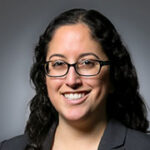This website uses cookies
We use cookies to ensure that we give you the best experience on our website. If you continue to use this site we will assume that you are happy with it.
Jump to:
Jaclyn Kelley-Widmer, Clinical Professor of Law
Alisa Whitfield, Adjunct Professor of Law (not pictured)

Jaclyn Kelley-Widmer
This spring, we had eight first-year clinic students working in pairs to represent a family of four Afghan siblings living in upstate New York. Each sibling is seeking asylum for similar reasons, but each must file an independent case. Clinic students conducted fact investigation, including thorough client interviews, and worked on the legal briefing in collaboration with advanced students from the Asylum and Convention Against Torture Appellate and the Afghanistan Assistance Clinics. After filing the cases, clinic students helped their clients prepare for asylum office interviews. We accompanied our clients to the interviews in late April, and expect to hear the results of their applications in the fall.
Additionally, clinic students, their supervisors, and several advanced students and interpreters traveled to rural Louisiana to assist detained immigrants through a partnership with the Southeast Immigrant Freedom Initiative of the Southern Poverty Law Center. Students worked in two different facilities, delivering legal orientation programming to immigrant detainees and providing individual legal consults.
Further, students represented members of the broader Cornell community in applications for DACA renewal and advance parole travel permission. Students also engaged in advocacy projects including presenting on current legal issues for the Ithaca Sanctuary Alliance and DACA and undocumented students on campus.
Finally, the spring and summer 2022 clinic teams saw success on four advance parole cases for Cornell DACA students. Our clients traveled to Mexico, India, and Italy through the travel permission we obtained for them. One client expressed that she was “relieved and thankful” to return to visit her relatives and home country for the first time since she was a small child. We look forward to continuing work on these meaningful projects.
Hilary Fraser, Adjunct Professor of Law

Hilary Fraser
In our third semester offering the Afghanistan Assistance Clinic, we saw a change in the type of cases and clients and a change in the kind of law student. In our initial semester, the law students had backgrounds in immigration law and human rights law. Our clients were uniformly Fulbright recipients recently arrived in the United States, and the cases were rich with evidence of the likelihood of future persecution due to the client’s activism and training with western donor nations in building democratic institutions.
At the start of this semester, there was some dismay that our new clients’ cases seemed weaker. Most clients were younger, some just freshmen in the United States. The law students were also new to client representation, and more tentative about interviewing the clients and gathering facts.
To overcome these challenges, we decided to drill down on the fact that our clients had lived through more than a year of Taliban rule. The Taliban’s announcements that floggings and amputations were legitimate punishments; that women could not work, attend high school, leave home without a chaperone or visit parks and gyms; that universities were shuttered, the internet policed, passport offices closed; and that ‘vice’ and religion were fastidiously monitored did not pose just future possibilities of harm, but rather defined the lives our clients had lived.
We also drew upon the experience of two classmates participating in the clinic for the third time, one as a Pro Bono Scholar and one as an indefatigable research assistant who won a public interest award from Cornell this semester. These senior students lent their experience to the class.
Overall, we filed fifteen asylum cases this semester, representing the collective work of eight first-time students, two second-time students, a Pro Bono scholar, a research assistant, and an adjunct professor. By summer 2023, more than thirty Afghan asylum applications filed by our clinic will remain pending, a terrific accomplishment in just eighteen months of work.
We also did a day of service at immigration court in New York City working with Catholic Charities.
Other landmarks reached this semester include:
Celia Bigoness, Clinical Professor of Law

Celia Bigoness
As we shared in April, the Entrepreneurship Law Clinic will be expanding significantly in 2024, as part of the new Blassberg-Rice Center for Entrepreneurship Law. In August, we’ll launch the hiring process to bring in two new clinicians to support the expanded clinic’s operations, both in Ithaca and at the Cornell Tech campus in New York City.
This spring, the Entrepreneurship Law Clinic had thirteen law students, two of whom were participating in the clinic through the New York Pro Bono Scholars program. Together, these students advised about a dozen clients throughout the semester.
Long-time clinic client AI-Learners, which develops educational software for children with disabilities, recently won first place in the Learn, Work, and Play category at the New York Business Plan Competition, and is now a finalist in the Accelerating Learning for All track of the 2022-23 Learning Engineering Tools Competition.
The clinic also started working with North Ferry Hats, a woman-owned hat business in Ithaca. North Ferry’s owner recently rebranded the business, and the clinic helped her set up a business entity and obtain trademark protection for her new brand. Clinic students were delighted to visit North Ferry’s newly renovated store in downtown Ithaca to see the new branding, which is also on display at the weekend Ithaca Farmers Market.
Briana Beltran, Lecturer
Reina Fostyk, Legal Fellow
Beth Lyon, Associate Dean for Experiential Education, Clinical Professor of Law, and Clinical Program Director

Briana Beltran

Reina Fostyk

Beth Lyon
Over the spring and summer of 2022, numerous Farmworker Clinic clients were granted Special Immigrant Juvenile visas and deferred action, putting them on a path to citizenship and allowing them to apply immediately for work authorization and social security numbers. In fall 2022, Legal Fellow Reina Fostyk launched the clinic’s Cooperstown office and began handling immigration matters in the Mohawk Valley region. In spring 2023, students Tasha Gottschalk-Fielding ’23 and Mikhail Spivakovsky-Gonzalez ’23 handled the first of these matters to go to trial, representing a farmworker in the Montgomery County Surrogate’s Court, giving her guardianship over her two young teenagers and qualifying them for permanent status in the United States. Student Sasha Brigante ’24 and clinic alumnus Justin Lin ’19 presented on the treatment of migrant workers in Taiwan for the Universidad Católica de Uruguay conference on Teoría crítica del Derecho y Justicia Social en las Américas.
Over spring break, clinic students and faculty traveled to work in two locations. Led by adjunct faculty member Galina Abdel Aziz and students Sasha Brigante and Brianna Satow ’24, four students prepared COVID income supplement payments for farmworkers with host agency UFWF in Bakersfield, California, and met with civil rights and union leaders. Pro Bono Scholars Iris Kim ’23 and Melissa Louidor ’23 partnered with HOLA Lakeway, the Southern Poverty Law Center (SPLC), and local law schools to screen dozens of food chain workers for immigration status in rural Tennessee, under the supervision of SPLC Senior Staff Attorney Felix Montanez ’12.
In May, a clinic client and his child who were forcibly separated at the border during the Trump administration were reunited in the United States.
Finally, clinic alumnus Pranoto Iskandar ’18 and Professor Lyon received a Mario Einaudi Center for International Studies Seed Grant for research on “Farmworker Self-Construal and Law Reform.”
G.S. Hans, Associate Clinical Professor of Law
Mark Jackson, Adjunct Professor of Law
Heather Murray, Managing Attorney of the Local Journalism Project
Christina Neitzey, Stanton Fellow (not pictured)

Gautam Hans

Mark Jackson

Heather Murray
Last semester, a New York trial court ruled in favor of clinic client The City in a case seeking access to New York City Department of Education records from its investigation into twenty-six Hasidic schools, and awarded attorney’s fees and costs. Former clinic colleague Ava Lubell and Heather Murray, managing attorney of the Local Journalism Project, filed the petition in this case in 2021, and Murray argued before the court for access in April 2023 — nearly two years to the day of that original filing. In June, the DOE filed a motion seeking to reargue, renew or, in the alternative, appeal that decision.
In March, the clinic secured the reversal of a school district policy in Pittsford, New York, which mandated that all members of district committees “remain positive and supportive of the District and Committee at all times and in all settings.” The change came after a member of the district’s Inclusivity Advisory Committee raised First Amendment concerns about the policy and its impact on her ability to express criticism of the school district. After the clinic’s intervention, the district agreed to exempt the clinic’s client from the policy immediately and eliminate the policy for all committee members starting this summer.
Clinic students Maria Kearns-Galeano ’23 and Matthew Hornung ’24 argued in May before the Commonwealth Court in a case seeking access to hate crime data from the Pennsylvania State Police on behalf of journalist Carter Walker and LNP Media Group, Inc. The court granted the state agency’s application to discontinue the case after it produced the data our clients were seeking. The clinic and co-counsel Reporters Committee for Freedom of the Press recently put in an application for attorney’s fees that may result in additional briefing and another appearance before the court.
The clinic filed a motion to intervene and modify the protective order in May in a Vermont federal court case to seek access to records concerning the largest financial fraud in the state’s history. The clinic and co-counsel Timothy Cornell of Cornell Dolan, P.C. represent investigative news outlet VTDigger in this matter, which involves a novel right to receive argument. Clinic students Alison Draikiwicz ’23, Andrew Gelfand ’23, Matthew Hornung ’24, and Lauren Kazen ’23 drafted portions of the brief. Hornung, Kazen and clinic summer fellows Nyssa Kruse and Aika Riguera drafted portions of the reply brief.
Elizabeth Brundige, Clinical Professor of Law
Lorelei Lee, Adjunct Professor of Law (not pictured)

Elizabeth Brundige
This spring, eighteen law students participated in the Gender Justice Clinic. Students supported more than thirty clients and engaged in diverse advocacy strategies. In May, the Gender Justice Clinic and co-counsel Wilkie, Farr & Gallagher LLP filed merits briefs in the two human rights cases before the Inter-American Commission on Human Rights, on behalf of survivors of military sexual assault. In addition, the clinic continued to represent gender justice and human rights advocates in their asylum cases and other related matters. Clinic students also advanced their work on a research and advocacy project addressing gaps and challenges in the Peace Corps’ efforts to prevent and respond to sexual violence against its volunteers, a handbook for legal actors on gender-based violence law in Zambia, and multiple initiatives in collaboration with and in support of people in the sex trades.
Sandra Babcock, Clinical Professor of Law
Chelsea Halstead, Associate Director (not pictured)
Kathryn Adamson, Research Fellow (not pictured)
Randi Kepecs, Program Coordinator (not pictured)

Sandra Babcock
Women facing the death penalty are a neglected population, and the Cornell Center on the Death Penalty Worldwide and the International Human Rights Clinic have led global efforts to expose how gender bias affects the outcomes of capital cases. In the last year, the center and clinic have assisted in the defense of fourteen women sentenced to death in the United States, Malawi, Cameroon, and Tanzania. Many of these had survived extreme gender-based violence. Seven had been convicted and sentenced to death for crimes they did not commit, and one was sentenced to death for killing her abusive husband after he attacked her with a hammer.
In February 2023, the center helped to win the release of Fati, a Cameroonian woman who had been convicted and sentenced to death for terrorism. The evidence against Fati consisted of an accusation by a jilted suitor, who claimed she had provided support to Boko Haram. Fati was tried before a military court, where she was represented by a trainee lawyer whom she had never seen, and who said nothing in her defense. After learning of her case, the center supported her lawyer, Nestor Toko Monkam, and recruited the law firm of Debevoise & Plimpton to provide additional legal and technical assistance. Toko Monkam fought tenaciously for her release, and eventually persuaded an appellate court to overturn her conviction and release her. She spent seven years under sentence of death before her release.
In the fall and spring semesters, clinic students drafted legal briefs for national courts in Malawi and Tanzania, and prepared a petition to be filed before the Inter-American Commission on Human Rights. All of these pleadings sought to establish precedent requiring courts to consider women’s experiences of gender-based violence in capital proceedings. In addition, students worked with a large international team of lawyers on a request for an advisory opinion before the African Court on Human and People’s Rights.
In spring 2023, the center received a seed grant to train defense teams how to effectively represent women and gender minorities facing extreme sentences. The funding will allow the center to establish an online technical assistance hub for defense teams representing women, including information on gender-based violence, women’s mental health, prison conditions, and creating gender-sensitive legal teams.
William Niebel, Tenants Advocacy Attorney and Adjunct Professor of Law
Yusong Jin LL.M. ’22, Tenants Advocacy Fellow (not pictured)

William Niebel
The Tenants Legal Hotline just reached an incredible milestone, logging its 1,000th intake. Each intake represents a household in need of legal advice or representation. The hotline, where the law school’s Tenants Advocacy Practicum receives cases, is a student-driven pro bono project started in the early days of the COVID-19 pandemic. It was created to help bridge the housing justice gap in Ithaca and the surrounding counties. The work of the hotline and practicum has only accelerated as pandemic-era tenant protections continue to disintegrate.
In related news, Upstate New York tenants can now learn about their legal rights through the practicum’s new automated chatbot on ithacatenantresources.org. A hula-hooping house, “Teny,” guides users through the thirteen-chapter-long comprehensive Tenants Rights Guide (available on the same website) in simple, bite-sized language. A team of six Cornell Law students created the chatbot as a self-directed project beginning in August 2022. It successfully launched in April and was featured in this year’s New York Statewide Civil Legal Aid Technology Conference, with more than 300 attendees.
Teny offers the user options in buttons, followed by pertinent legal information, so that tenants can easily access the most relevant topics quickly and at any time of day. It links to sections of the law as well as local and national legal aid organizational resources. These include, for example, a template for writing a letter to a landlord. These tools and ease of access will help increase tenants’ awareness of their rights, support the work of the hotline, and provide information for urgent concerns. In the coming year, the chatbot’s functionality will be upgraded, incorporating aspects like natural-language processing and AI capabilities, and will expand its collaboration with legal aid organizations.
Also in April, the practicum obtained its second important local precedent. Published in Lexis+, the court decision confirmed that when a tenant appeals an eviction case, they may obtain an automatic stay—that is, a hold on the eviction—during the appeal by paying for ongoing use and occupancy from the start of the appeal. This amount of money (referred to in the law as an undertaking) is paid to the court to protect the landlord’s interests during the appeal process and is generally equivalent to ongoing rent. It is vitally important that the courts follow this precedent and set the undertaking as ongoing use and occupancy from the taking of the appeal (not at the value of the underlying judgment, which may be many months of rent arrears). This ensures that the tenant is not evicted before having the opportunity to pursue their appeal, especially if the tenant should not have had a judgment against them in the lower court.
In the Milton Meadows Lansing, LLC v. Lewis case, where the practicum represented Ms. Lewis, the Tompkins County Court ruled that Lewis was entitled to an automatic stay of her eviction if she paid the ongoing use and occupancy starting from the time she filed her appeal. Lewis owed over thirty months of rental arrears and only fifteen of those months could be paid by the Emergency Rental Assistance Program (ERAP). The landlord argued that Ms. Lewis should have to pay all the arrears not covered by ERAP (over fifteen months of rent) to keep her eviction on hold—an impossibility. Nevertheless, the court held that, according to the New York Civil Practice Law and Rules, the undertaking should be set at use and occupancy from the time she filed her appeal (in March 2023) and ongoing. This meant that the tenant could pay just two months of rent to the court to obtain an automatic stay, keeping the eviction on hold. As noted above, this case has clear precedential value in ensuring that tenants will not be rendered homeless before having the opportunity to pursue their eviction appeal.
Ian Kysel, Assistant Clinical Professor of Law

Ian Kysel
Students Maria Giovanna Jumper ’24 and Zaydee Rain Stemmons ’24 drafted an amicus brief filed in an appellate administrative tribunal in Mexico on behalf of the Global Strategic Litigation Council for Refugee Rights. The case, brought by NGOs, challenges Mexico’s cooperation with the United States to facilitate expulsions without process at the U.S.-Mexico border. The student attorneys argued for the clinic’s client that title 42 violated international law. Although the title 42 expulsions ended on May 11, the U.S. continues to rely on Mexico for the externalization of border control south of the border and the case could play a significant role if the court effectively forces Mexico to hold the U.S. to its human rights law obligations.